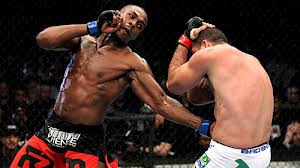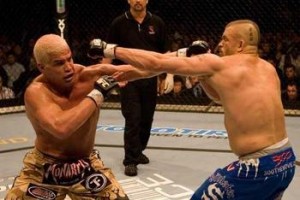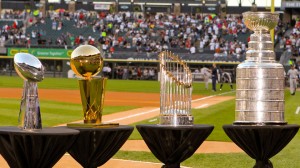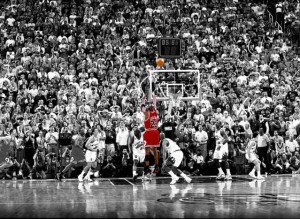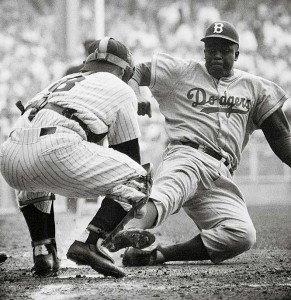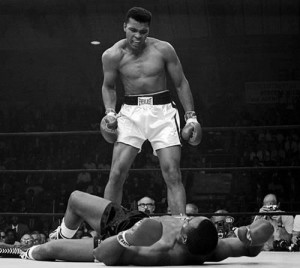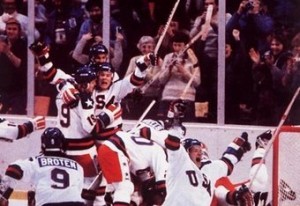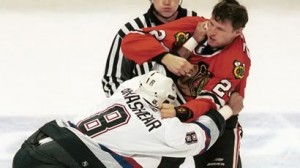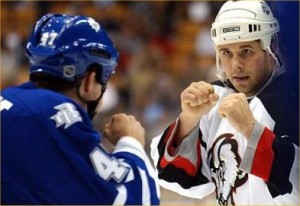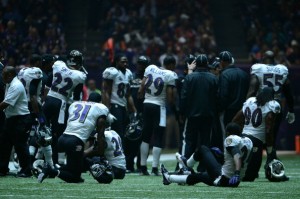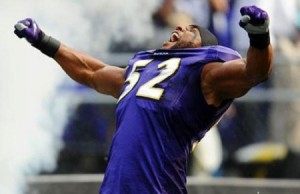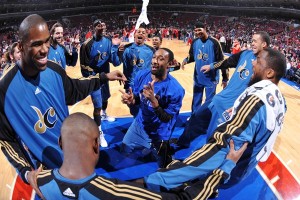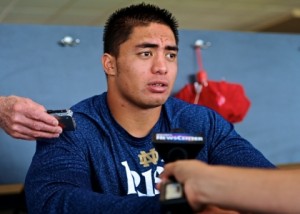Stumbled across this video on the internet. It has some pretty incredible and fun sports moments. If you need to kill five minutes, I highly recommend giving it a look. It’s a better time waster than this, that’s for sure.
Author Archives: bkatz
Let’s Get Ringside: MMA is here to stay
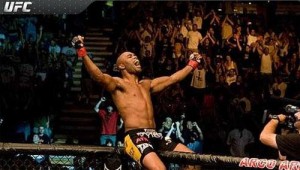 Mixed Martial Arts quite literally kicks ass.
Mixed Martial Arts quite literally kicks ass.
As a casual fan, I don’t know every fighters name. I don’t know the precise technical aspects of the sport. I don’t even know how fighters get punched in the nose without crying like a little girl, something I have yet to master.
But I do know that MMA is easily one of the most exciting sports. A good fight contains some of the best minute by minute action in athletics. Nearly every fight possesses the intensity of a playoff game because losing is not an option.
There are no seasons. Fighters can’t afford to drop a match here or there or lose focus. Win or go home.
Don’t say it’s human cock fighting because you will just come off as close minded and uninformed. Detractors of the sport should note that in its short existence, MMA has seen considerably less head injuries than boxing or football.
Mixed Martial Arts requires a mastery of several different fighting disciplines. Quality fighters need to be able to combine countless styles, approaches and abilities in order to compete. It is a sport of skill and intelligence just as much as sheer physicality.
The UFC has the MMA market cornered for the moment. The organization has done a good job borrowing from the NBA’s model where star power is the primary currency. The UFC has invested heavily in scouting and developing top quality talent on a consistent basis. They’ve strategically built up certain fighters such as Georges St-Pierre, Anderson Silva, and Jon “Bones” Jones while carefully crafting and growing their brands. UFC decision makers also had the foresight to develop a young crop of fighters ready to take the mantle from the older legends on their way out.
MMA is the fastest growing sport in the world thanks in large part to the $1 billion organization the UFC has become. With events and fighters from all over the globe, the international audience is assured to sustain this scintillating combat sport.
If you are still unconvinced of the validity of MMA, I’d suggest just getting over it because the sport isn’t going anywhere. MMA is here to stay.
Why do I love sports?
I love sports because it is a world us regular people will never fully understand. It is a world where individuals show us things we never thought possible. It is a world where anything and everything can happen and humans are no longer bound by common physical limitations.
Why do I love sports?
I love sports because it allows us to join an entity bigger than ourselves. Being a fan isn’t just about rooting for a team. It’s about entering an entire culture of people who share the same passion as you. It’s about walking down the street in a random city far away from home and instantly connecting with someone because they’re wearing the same jersey as you.
I love sports because in those rare moments it can transcend beyond just a simple game. It can represent an entire society with its flaws and successes, its limits and potential. Its impact can surpass mere winning and losing as special moments evolve into lasting iconic images engrained in our culture and passed down among generations.
I love sports because athletes chase their dreams. They aren’t afraid of failure and they are willing to work for what they want most. No matter how outlandish or impossible, they refuse to give up. I like to think the same applies to all of our dreams and watching sports reminds us of that.
I love sports because, at the end of the day, I just want a few hours to get away from it all. I want a few hours to become lost in something that I enjoy. I want to feel connected while also entertained.
Why do I love sports?
I love sports because of family moments like this.
So tell me, why do you love sports?
It’s time to civilize the NHL
Take a look at the video above.
What we see are several hockey fights. Nothing too important, right?
Wrong.
It’s time for the NHL to rid itself of the attention grabbing gimmick that is fighting. Now, I understand that these physical altercations are a deeply rooted part of hockey’s culture and tradition. I understand that they act as an important attraction to the casual NHL observer such as myself.
But at this point, we need to allow hockey to survive in the mainstream sporting world on its own merits and not the bloody highlight clips that garner cheers and viewership. Can you imagine the severe penalties that would ensue brawling for players in any other major sport?
Fighting is an outdated custom. Every time I watch a hockey brawl, I half expect Russell Crowe to come out on the ice screaming, “Are you not entertained?!”
Despite the many flaws that still exist in the NFL, there is no denying the importance the league has placed on player safety in the last decade or so. Their has been a significant shift in how teams play defense due to rule changes and tackling restrictions. Has this changed the game? Yes, to a certain degree. But, a player’s risk for serious injury has been slightly decreased as a result. In the end, isn’t that worth it?
I know the NHL has taken steps to decrease fighting, but not enough has been done. The continued support of this barbaric tradition does nothing to add to the game itself.
What type of message does this send to young admirers? Is the risk of serious injury truly worth briefly catching the attention of an informal fan?
Hello, NHL? It’s the modern world. Please, won’t you join us?
The Super Bowl black out
 According to this article, Superdome officials have been worried for months at the potential for a power outage during America’s most popular sporting event.
According to this article, Superdome officials have been worried for months at the potential for a power outage during America’s most popular sporting event.
The level of incompetence involved in this is breath taking. How can the Super Bowl venue be so ill equipped? If they believed there was a better then average chance of a black out occurring, why didn’t they prepare against it? The article sites considerable concerns over the condition of the stadium’s electrical feeders. These concerns had been voiced months beforehand and yet the issue was not dealt with. How can the Super Bowl be handled with such apathy?
Now, the NFL has said that the black out will not affect New Orleans’ chances of hosting another Super Bowl in the future. But, I’m sure league officials were distraught behind closed doors. Such a massive screw up is inexcusable for the most viewed event of the year.
Step ya game up.
Ray Lewis and PEDs
http://www.youtube.com/watch?v=c_bAnw6EgjE
The above video is an impressive highlight compilation from Ray Lewis‘ career. If the Baltimore Ravens Super Bowl victory didn’t further cement Lewis’ legacy as one of the greatest linebackers of all time for you, then you clearly have not been paying attention to the NFL. What makes the middle linebacker’s accomplishment this season even more amazing is his incredible recovery from a torn triceps. Lewis returned a mere 10 weeks after the injury when the average recovery time is known to be around six months.
But, as reported during media week, Lewis may have utilized a banned substance to aid in his recovery. Yet, no one seems to care that much. Yes, the media covered it and asked Lewis all of the important questions. But, it appears as if the general public is just as happy to sweep this under the rug and let Lewis ride off into the sunset.
As columnist Bill Simmons argues in his article “Daring to ask the PED question”, the public should hold NFL players to the same standard as other sports. We should demand an even playing field and shun those that fail to adhere to the rules. And yet for some reason, we don’t. Commissioner Roger Goodell doles out a four game suspension for first time violators and the media move on.
Why is that?
Are we so entertained by the sheer brutality of football that we subconsciously want these behemoth athletes to continue growing stronger and hitting harder?
The league, the media, and the fans should value fair competition over bone crushing hits and inhuman athleticism. Performance enhancing drugs are a part of professional football. It’s about time we address that.
Dismantling The Gun Culture in Professional Sports
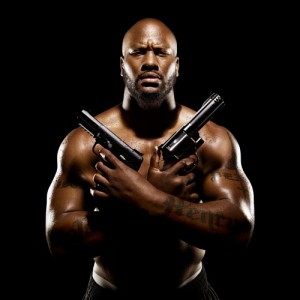 Are guns synonymous with toughness?
Are guns synonymous with toughness?
Do they make one appear cool?
Have guns become necessary for protection?
Are they simply a guilty pleasure?
The answers to these questions differ depending on whom you ask. The one guarantee, however, is that guns are an increasingly prevalent aspect within the professional sports world.
Luke Scott, currently with the Tampa Bay Rays, said in a 2006 interview with ESPN that he estimates that 50 percent of MLB players at the time owned some type of gun. In the same article, Roger Renrick, a body guard whose worked for NBA stars such as Jalen Rose and Paul Pierce, guessed that roughly 60 percent of NBA players possessed a gun. NFL free agent receiver Jabar Gaffney estimated that close to 90 percent of NFL players owned a gun.
Of course, it is perfectly within one’s right to own a firearm. Many athletes use guns for sport and protection.
But, let’s review the past few years. In 2010, All-Star guard Gilbert Arenas was suspended for brandishing a gun in the Wizards locker room during a dispute with teammate Javaris Crittenton. A year later, Crittenton was arrested for the shooting death of a 22-year-old mother of four.
In May of 2012, All-Pro linebacker Junior Seau committed suicide by shooting himself in the chest multiple times. In late 2012, Kansas City Chiefs linebacker Jovan Belcher fatally shot the mother of his child a total of nine times before killing himself shortly after.
These are only three examples out of the many gun related incidents involving professional athletes.
Many athletes grew up in crime ridden areas where gun possession was wide spread. To carry a firearm was similar to having a cell phone, barely an after thought. Whether it was for protection or other uses, owning a gun was commonplace. Unfortunately, that same mentality has manifested itself into an epidemic at the professional level.
The association between guns, coolness and toughness is deeply embedded. These childhood tendencies and viewpoints have clearly stayed with many of the current professional athletes.
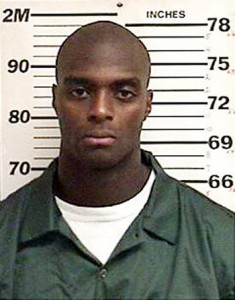
NFL receiver Plaxico Burress was sentenced to two years in prison for criminal possession of a handgun.
Pop culture has contributed to the mainstream acceptance of guns. Our television shows, video games and movies are saturated with gun violence to the point that it has desensitized us to the true dangers. Popular musicians in the Hip-Hop genre frequently praise their weapons in their lyrics. American culture regularly employs fake violence as entertainment. Growing up in this type of environment is bound to condition one to associate positive attributes to negative actions.
For every professional athlete that has a fascination with guns, there are a handful of regular people with the same affliction. There are young kids who look up to these athletes as role models and emulate their behavior. If they are bombarded with popular media that reinforces the coolness of guns and see their heroes using them frequently, it is only reasonable to expect them to do the same. Gun culture may be a critical problem within the sporting world, but its effects seep into everyday life as well.
Ultimately, there needs to be a better understanding of the dangers that accompany guns. Incoming players need to be further educated on gun violence and proper firearm conduct. There have to be programs that counter the negative effects entertainment yields in regards to guns. Players, as well as regular people, need to be shown that guns don’t make someone cool and tough and instead can lead to horrific violence. When examples like Jovan Belcher, who owned over eight guns, surface it crystallizes the fact that the need for weapons exceeds mere protection within this culture. There are other factors under the surface that are driving this fascination and it is these factors that need to be addressed.
The core issue is not just that there exists a gun culture among professional athletes, but that a gun culture exists throughout the country.
As with many problems, the mentality behind this attraction needs to be changed for the good. It may be extremely difficult to break habits that have developed since childhood. But, we are seeing the NFL attempt to do it with player safety on the field. There should be increased focus for safety off the field as well.
In a recent interview with Jon Stewart, Bob Costas discussed the gun related issues that plague professional sports. Costas succinctly argued that their needs to be a greater emphasis placed on combatting the attitude towards guns rather then repealing the Second Amendment. The issue is not the infringement of one’s rights and the changing of laws. Rather, it is the popular nature of guns among the players. There is a lack of understanding, regardless of intent, of what guns are capable of.
Costas goes on to say, “What are the chances that out of every 100 incidents, that these [guns] are being used for sporting purposes, or just legitimately for self-defense, as opposed to something tragic, even if it’s unintentionally tragic, happening?”
It’s time that the major sporting organizations join together and dismantle the gun culture that exists within professional sports. This will serve as the first step for disbanding gun culture as a whole.
The Right To Privacy: Should We Be Laying Off Manti Te’o?
Louis D. Brandeis, co-author of the 1890 Harvard Law Review article “The Right to Privacy,” believed that the press at the time was, “overstepping in every direction the obvious bounds of propriety and decency.” Brandeis criticized media outlets at the time for their invasiveness while urging lawmakers to include legislation that protected one’s right to privacy. Over one hundred years later, our society is still struggling to find a balance between the public’s right to know and the individual’s right to privacy.
Recently, the bizarre story of Manti Te’o and the elaborate online hoax he was involved in has put this uneasy balance into focus. Te’o, a standout linebacker at Notre Dame, had garnered significant attention for the heartbreaking story of his girlfriend’s tragic death during the season.

The above photo was one of several images used in Lennay Kekua’s fake online profiles.
However, as we now have come to know, this girlfriend never existed. In fact, it was a cruel and intricate hoax orchestrated by a catfisher.
What is most troubling about this entire story isn’t whether or not Te’o knew what was going on, but America’s obsession with the story itself. Since the story broke, the Te’o hoax has received top billing from nearly every major media outlet. Suddenly, this 22-year-old’s entire life has come under constant and extreme scrutiny.
Was Manti Te’o directly involved in the hoax? We don’t know. He and everyone in his campy adamantly deny any involvement in the scam. From a distant perspective, it appears as if he’s an innocent and naive young man who was too embarrassed to come forward when the truth initially came out.
Yet, our culture is devouring this story with what appears to be an insatiable appetite. The public pounces feverishly on every new update and the media compete relentlessly for exclusive information. Isn’t this overkill for a story that basically boils down to a too trusting young adult allegedly getting duped? If you felt inspired by Te’o’s story and rooted for him because of it, yes, you have the right to be upset by this. But, why has an essentially victimless crime become the single most attention getting story in the country?
Our society’s incessant need to know drives a non-stop news cycle that has become increasingly invasive within our lives. In an era of immediate access to information, Te’o has become the latest victim to fall into the public eye. As a result, the athlete and those around him have been forced to defend him publicly on numerous occasions. For some reason, the public continuously demands answers from him that he simply may not have.
Te’o deserves a measure of privacy to gather himself in what is obviously a tumultuous time for him and his family.
America needs to move on to a real news story and give this kid a break.
